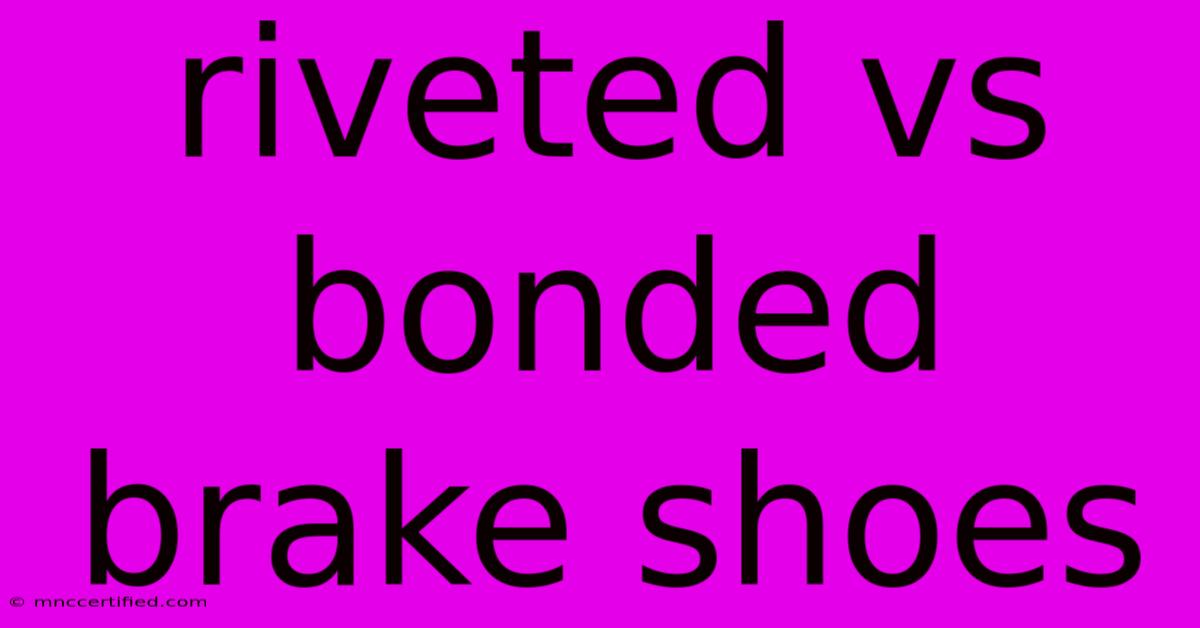Riveted Vs Bonded Brake Shoes

Table of Contents
Riveted vs. Bonded Brake Shoes: Which is Right for Your Vehicle?
Choosing the right brake shoes is crucial for vehicle safety and performance. While both riveted and bonded brake shoes effectively stop your vehicle, they differ significantly in their construction, lifespan, and overall performance. This article will delve into the key differences between riveted and bonded brake shoes, helping you make an informed decision for your specific needs.
Understanding Brake Shoe Construction
Before comparing the two types, let's briefly understand the fundamental function of brake shoes. Brake shoes are components of drum brakes, creating friction against the brake drum to slow or stop the vehicle's wheels. The friction material is the key element, and this is where riveted and bonded shoes diverge.
Riveted Brake Shoes
Riveted brake shoes feature friction material mechanically fastened to the steel shoe using rivets. These rivets, small metal pins, physically secure the friction material to the backing plate. This is a traditional method known for its durability and relatively low cost.
Pros of Riveted Brake Shoes:
- Robust Construction: The rivets provide a strong, secure bond, resistant to high temperatures and pressure.
- Cost-Effective: Generally less expensive than bonded brake shoes.
- Long-lasting (potentially): With proper maintenance, they can provide a lengthy service life.
Cons of Riveted Brake Shoes:
- Potential for Rivet Head Failure: The rivets can loosen or fail over time, leading to friction material loss and uneven braking.
- Noise: Loose rivets can create noise and vibration during braking.
- Uneven Wear: The friction material can wear unevenly due to the presence of rivets.
Bonded Brake Shoes
Bonded brake shoes, on the other hand, utilize an adhesive to attach the friction material to the steel shoe. This creates a seamless bond, offering several advantages over the riveted design. The friction material is uniformly distributed, leading to better braking performance and longer life.
Pros of Bonded Brake Shoes:
- Smooth Braking: The absence of rivets results in a quieter, smoother braking experience.
- Even Wear: The friction material wears more evenly, leading to improved brake performance and longer life.
- Improved Heat Dissipation: The seamless bond facilitates better heat dissipation, enhancing braking efficiency.
- Longer Lifespan (generally): Often outlast riveted shoes.
Cons of Bonded Brake Shoes:
- Higher Cost: Bonded brake shoes typically cost more than riveted ones.
- Sensitivity to Heat: Extreme heat can potentially compromise the adhesive bond, though modern adhesives are designed to withstand high temperatures.
Choosing Between Riveted and Bonded Brake Shoes
The best choice depends on several factors, including your budget, driving style, and vehicle type.
- Budget: If cost is a primary concern, riveted brake shoes are a more affordable option.
- Driving Style: For aggressive drivers or those frequently using their brakes in demanding situations, bonded brake shoes' superior heat dissipation and even wear may be beneficial.
- Vehicle Type: For vehicles that experience heavy braking, such as commercial vehicles or those used for towing, bonded brake shoes are often preferred.
Factors to Consider When Replacing Brake Shoes:
- Always replace brake shoes in pairs. This ensures even braking and prevents premature wear.
- Inspect the brake drums for wear and tear. Damaged drums can affect brake shoe performance.
- Consider the quality of the brake shoes. Choose reputable brands that meet or exceed industry standards.
Ultimately, bonded brake shoes generally offer superior performance, longer life, and smoother braking, although they come with a higher price tag. Riveted brake shoes remain a viable option for those seeking a budget-friendly alternative, provided regular inspection and maintenance are performed. However, for optimal braking performance and longevity, bonded brake shoes are usually the better investment. Consult a qualified mechanic if you're uncertain about which type is best for your specific vehicle.

Thank you for visiting our website wich cover about Riveted Vs Bonded Brake Shoes. We hope the information provided has been useful to you. Feel free to contact us if you have any questions or need further assistance. See you next time and dont miss to bookmark.
Featured Posts
-
Mbappe In Madrids Starting Xi Vs Liverpool
Nov 28, 2024
-
Conor Mc Gregor Dees Public Backing
Nov 28, 2024
-
Aston Villa Vs Juventus Live Final Score
Nov 28, 2024
-
Goldman Sachs High Yield Bond
Nov 28, 2024
-
Volleyball Team Bonding Games
Nov 28, 2024